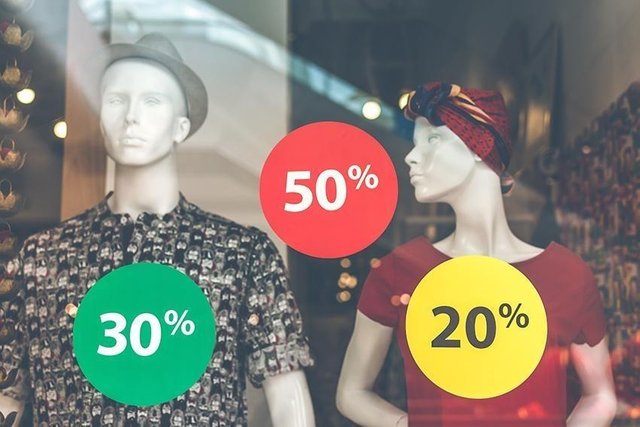The victims of marketing: how to stop buying what you don't need.
In this article you will learn:
How marketers make us buy;
How to stop trusting marketing tricks;
The relationship of self-esteem and impulsive shopping;
The choice of motivation to control spending.
Modern residents of developed countries spend fortunes on things that they don’t need. This leads to depletion of the wallet, mountains of trash and damaged nerves. In his book, the famous businessman Robert Kiyosaki used the term “rat race” - so he called the endless race of people for new purchases, for which they burn hours at work, lose money and get into debt. As a result, they are left with nothing. In response to this trend, a stream of minimalism and conscious consumption arose, but alas, it has not yet become a global trend.
Fear of losing this unique dress ...
Aggressive marketing, which surrounds us at every turn, works with the deep hidden desires of man. That is, even a person himself very rarely understands why this particular product causes such a thirst to get it. It is very difficult to recognize the manipulation schemes that you become a victim of.
The simplest level of control of the buyer’s mind is to artificially create hype. “Limited offer”, “70% discount”, “limited version”, etc. - This is a game of anxiety. The campaign is built in such a way that you begin to believe that you are really losing something. In this case, stop and ask yourself: "How can I lose what I already do not have?" The feeling of loss at a subconscious level causes fear and anxiety - this is a protective mechanism of the psyche. In ancient times, this forced people to step up their forces and fight for survival. Unfortunately, our brain cannot distinguish whether we really are in danger, and creates a sense of anxiety from loss, calling us to action.
Way Out 1. Just Stop Believing Marketers
Love buying on Black Friday? And did you pay attention to what price was on the goods before you saw the coveted “-50%” on it? Often, discounts are made on days of increased demand either on slow-moving goods, or under incomprehensible conditions, or not at all, while they put the information as if there was a discount. Do not let yourself be fooled.
When you go shopping, buy only what you followed.
If the “-50%” discount forced you to go to the store, but turned out to be on the wrong product, don’t buy another one - this is a primitive way to attract your attention and force something to buy.
Do not go to the store hungry and tired. It has long been proven that a hungry person buys many times more at a grocery store. And if you are hungry and tired, it will be difficult to make a sound decision about any purchase. If you want to buy something large, be sure to take care of your comfort and well-being first.

I think for anyone who at least somehow understands the elementary laws of business, it is clear that no company will sell goods at a price that is not beneficial to them. If you buy the right thing and at a discount - this is a nice bonus, if you buy only the "discount" - it’s nice only to those to whom you give your money.
Way out 2. Work with self-esteem
“What makes people work for just $ 1,000 a month?” I tell you that you deserve more ”- an aggressive approach to sales, on the one hand evoking a sense of inferiority (many people work for a lower salary, but in this case the amount will always be above average), and on the other, playing on the client’s ego - each of us believes, at least in his heart, that he deserves a larger, better position and highest salary. Such confusion is the best feeling in a person with whom advertisers can “work”. With this sauce, trainings of personal growth and popular psychological webinars are very successfully sold.
“Be in trend” is the most popular message of commercials. In other words, with different pictures, the advertisement says one thing: without certain things you cannot feel successful - you believe in it. The secret is simple: you can. And, besides, things do not add happiness and success in the end at all. This is a passing satisfaction that quickly dissipates, and in the end you want to repeat it again and again.

But what about those people who flaunt things and show off their spending? The fact is that our self-esteem can be either stable or unstable.
Stable - adequate self-esteem, it is difficult to shake, such a person knows how to look for support in life, does not despair too much due to setbacks and can sensibly assess his capabilities.
Unstable self-esteem is a bipolar phenomenon, when low self-esteem is replaced by overestimated, depending on the circumstances. People with inadequate self-esteem have to make a lot of efforts to feel better, including unjustified spending, sacrificing their interests to please others, associating themselves - their own worth - with expensive things. If such an individual has extraordinary abilities or income, then his self-esteem is replaced by overestimated. But he still remains dependent and vulnerable. Therefore, it is important to work with self-esteem and bring it to a stable, adequate level.
If you have good self-esteem, you don’t need to go out of your way to please others, to feel recognition. And you are much more difficult to manipulate marketers. At a minimum, you will treat all the information with a reasonable degree of criticality - this is just what you need.
How to work with self-esteem?
celebrate real successes, do not ignore even small achievements;
read books about self-esteem;
if necessary, consult a psychologist - to work out old injuries;
take responsibility for your life and make informed choices;
be honest with yourself;
live purposefully.
What is your motivation? Exit number 3.
Divide your motivation into two types: the one that makes you buy, and the one that keeps you from buying. Set yourself real goals that will motivate you not to buy unnecessary things.
Every time you make a choice, think about your motivation for deliberate purchases. Make a decision carefully.
Here are some ideas to motivate you to not buy too much.
- Caring for finances
Impulsive purchases are extremely negatively reflected in our wallet. From these purchases we enjoy only a few seconds, after which the pleasure dissipates. And it’s good if the purchased items will be used. But in 70% of cases it is not used. You are unlikely to use a set of branded pans if you have never liked to cook before, and most likely you will not wear a dress that is too catchy for your style, but bought at a special price.

- Caring for the environment
A consumer boom is a mass of unnecessary things that overwhelm landfills. These are carbon dioxide emissions into the atmosphere during production, which poison our body and destroy nature. This is a destroyed ozone ball and polluted oceans.
And the art of design and lifestyle has become popular philosophy of minimalism - the rejection of the unnecessary in favor of greater ergonomics and lightness.
Awareness is freedom
Dependence on brand things, the opinions of others, and trending products is a serious trap that turns into a vicious circle. Awareness leads us to freedom. Awareness in nutrition, in emotions, in relationships, in purchases, including. You cease to be dependent on external circumstances and do not succumb to manipulation.Shopping eats your time
Time is the only irrevocable resource. When shopping turns into a hobby - this is a serious problem. How much time do you lose looking at the pages of online stores and trying on clothes at the next sale? If you think about it, the numbers are frightening. You could spend this time with loved ones, in nature, for the benefit of yourself.
Warning! This user is on our black list, likely as a known plagiarist, spammer or ID thief. Please be cautious with this post!
If you believe this is an error, please chat with us in the #appeals channel in our discord.